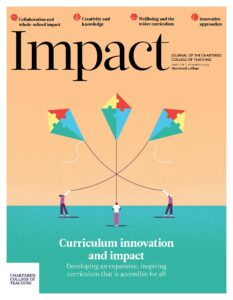JENNY GRIFFITHS, RESEARCH AND KNOWLEDGE MANAGER, TEACH FIRST, UK
Background
In the wake of two years of disruption of learning due to the pandemic, there are increasing concerns about the wellbeing of children and young people beyond the narrative of the need for academic ‘catch-up’ (DfEDepartment for Education - a ministerial department responsible for children’s services and education in England, 2023). Reports of greater numbers of children performing below expected levels (Juniper Education, 2022) and fears that the attainment gap between disadvantaged students and their more advantaged peers is growing (Hunt et al., 2022), have been accompanied by growing numbers of children believed to be suffering from mental health disorders (Crenna-Jennings, 2021). In 2020, one in six children aged seven to 16 years was considered to have a probable mental disorder, with the rate increasing to one in four for 17- to 19-year-olds in 2022 (NHS Digital, 2022).
A growing body of work on whole-child development demonstrates the interconnection of physical, social and emotional, and cognitive wellbeing and development (ASCD, 2012; Darling-Hammond and Cook-Harvey, 2018; ACER, 2020; Porticus et al., 2023). We need to consider how our education system supports the development and wellbeing of every aspect of children and young people, both now and for the future. Children may struggle to learn effectively if they are suffering with ill health or poor mental health; children will struggle to learn effectively if they are not given space to learn social skills or develop emotional regulation and self-efficacy. With a whole-school, whole-child approach, we can address barriers to learning more effectively and improve outcomes for children and young people. Too often these elements are viewed in isolation or as secondary to the academic outcomes of schools, which are prioritised in such accountability measures as league tables and Progress 8 scores. Schools assiduously track assessment scores, but fewer look at measuring wellbeing.
As Sir Kevan Collins, in the Education Policy Institute (EPI) annual lecture (30 November 2021), said, ‘It’s the whole child and the whole learning experience that matters. The recovery is the recovery of childhood, not just education.’
What is a whole-child approach in education?
There isn’t a single agreed definition of whole-child development, but it can be considered as encompassing four key elements: physical, social (interpersonal), emotional (intrapersonal) and cognitive development. These things combined are what determine the outcomes for children and young people. It can be helpful to consider the whole child within Bronfenbrenner’s ecological systems theory (1986). Bronfenbrenner’s theory sees child development as taking place in a complex system of relationships, from the family, school and peers immediately adjacent to the child, to their wider environment, such as their parents’ economic situation, extended family and friends, government agencies, etc. These layers all interact in multiple ways to influence the child at the centre. In this model, we consider school and family as crucial elements of the ‘microsystem’ directly influencing the development and wellbeing of the child.
In the Early Years, the three prime areas of learning are: communication and language, physical development, and personal, social and emotional development. These naturally form the core elements of a whole-child approach, one that is adopted by many primary schools, although it is not necessarily named as such. The development of gross and fine motor skills is known to be essential to developing writing, and learning self-regulation is a crucial part of learning to interact with others, through both the learning environment and the curriculum. Characteristics of effective learning are developed holistically through the EYFS framework, and not divorced from context or curriculum.
This whole-child approach continues into primary, as children start to experience distinct subjects such as history or computing, alongside the literacy and numeracy skills that they have already begun to develop. The importance of playing and exploring is understood to be a key element in engagement and motivation, which are part of creative and critical thinking. Schools recognise this interplay with relational teaching, embedding social and emotional developmental learning throughout the day. However, the tension between the development of traditional academic learning skills and the more holistic approach seen in the Early Years becomes increasingly apparent in many schools.
When it comes to secondary school, having a ‘whole-child lens’ can be more challenging, as children are now the responsibility of a myriad of subject specialist teachers, perhaps with oversight from a tutor, but without the same generalist approach to development that is possible in primary schools. The pastoral system may be divorced from the academic, and is often overwhelmed by those with more complex needs, acting responsively rather than preventatively. In this case, it can be helpful to think at three different levels: at the whole-school level, by subject groupings and in the classroom. By doing so, we can start to recapture the holistic approach so apparent in the Early Years and avoid the practical separation of social and emotional development to PSHE (personal, social, health and economic education) lessons, or physical development to PE lessons.
Why is a whole-child development approach so important?
Following the disruption caused by the COVID-19 pandemic, there have been a number of reports looking at the impact on academic outcomes (Ofqual, 2021), but also at the social and emotional impact and physical wellbeing.
Lockdown made it difficult for many children to engage in adequate physical activity (ImpactED, 2021), but we already know that self-esteem and physical activity levels drop suddenly and rapidly among girls of secondary age. Low levels of physical activity remain associated with low self-esteem and wellbeing scores in both girls and boys throughout adolescence. Being overweight is also associated with worse MEH (mental and emotional health) outcomes for both boys and girls, with a lasting impact on negative body image and related social interactions (Crenna-Jennings, 2021). In 2020/21, around 28 per cent of Reception-age children (four to five) were considered obese or overweight. By Year 6 (age 10 to 11), 41 per cent were considered obese or overweight (Baker, 2023). This association between physical and mental health and wellbeing has been known for a long time. There is increasing awareness of a range of factors related to physical health and wellbeing that affect learning: sleep, mood, managing stress or anxiety, self-esteem, and connecting with other people (Mind, 2019; Public Health England, 2014).
These links between physical and mental wellbeing need to be more explicitly understood in order to secure positive outcomes for all pupils, particularly as we continue to seek to understand the impact of the disruption to the lives of children and young people as a result of the pandemic. The Prince’s Trust survey (2022) suggests that the emotional impact of the pandemic could be devastating, with the overall happiness and confidence of young people hitting the lowest point in its 13-year history: almost half of young people reported experiencing a mental health problem, and a quarter of the disadvantaged and unemployed reported that they always feel anxious. The experiences that children have in school influence their later life, so it is important that we get it right.
What does this mean for school leaders and teachers?
At a whole-school level, we need to remember that children develop at different rates – for example, their emotional development may lag behind their cognitive, particularly as a result of COVID disruptions. This means that we should interrogate whole-school policies in relation to homework or behaviour, for example, and whether or not they are as appropriate for an 11-year-old as a 16-year-old. Similarly, we can consider how curriculum content might affect children of different ages or backgrounds, particularly where it might have emotional implications – for example, the study of themes in literature that touch on the lived experience of students. This will undoubtedly vary for different subjects. In the individual classroom, while consistency can be beneficial to learning, a whole-child lens may also help teachers to develop the positive learning relationship and environment – and adaptive teaching – required to ensure that all children can aspire and attain.
As a teacher and leader, considering the whole child helps to remind us of the complexity of learning behaviours. With a whole-child lens, we can consider the multiple influences on pupil behaviour and learning that extend beyond the immediate context of school. It also becomes more apparent that relationships interact in complex and often unpredictable or unexpected ways. Social norms underpinning behaviour in the classroom may need to be taught or challenged, because peer influences and home life may be very different from the experience of being in school.
Whole-child approaches encompass the physical, emotional, social and cognitive development of children. This doesn’t happen in neat stages determined by chronological age or year group. Teachers and school leaders need to be intentional in how they look at the factors that interact and influence learning and behaviour, and how these relate to development. We should consider every aspect of a child’s development as important if we want to secure positive outcomes from education.











